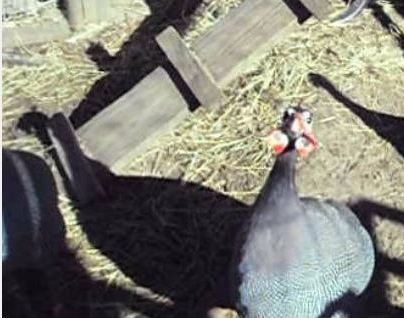Breed Details: Their eggs are thick shelled and harder to break than most chicken eggs. Pearl guinea fowl are valued as natural pest controllers. Many people raise them to help control the deer tick, which is a carrier of lyme disease. Their diet consists of various insects, including ticks, wasps, bees, grasshoppers and many other garden and lawn pests. They also eat a variety of seeds, grasses and grains. They will also eat chicken feed when offered, and are often fed a game bird feed. Only female guineafowl can make the two- note call that sounds like "buck-wheat". Both male and female guineas can make the single note call. Males will also have larger wattles than a female, but it's often difficult to tell the gender of the bird by looking at the wattles. They are often kept with other fowl because of their high alertness and awareness. They are flock birds and are very social. They do better when kept in a moderate to large size flock than they do on their own. Adult pearl guinea fowl are very hardy. Pearl guineas are great lookouts and are often the first to spot a predator. When they sound the alarm they are very noisy and everyone close by will hear it. When they feel threatened, they will form a tight group and stick together. Sometimes they will follow and harass whatever they feel is a threat. My pearl guinea fowl have saved my flock three times from hawks by letting us know with their loud, harsh calls. The incubation period for guinea fowl is 26-28 days. Young guineas should be kept dry and warm. |
Navigation
Install the app
How to install the app on iOS
Follow along with the video below to see how to install our site as a web app on your home screen.
Note: This feature may not be available in some browsers.
More options
You are using an out of date browser. It may not display this or other websites correctly.
You should upgrade or use an alternative browser.
You should upgrade or use an alternative browser.
Pearl Guinea
- Author Pinky
- Publish date
- Article read time 2 min read
Article information
More from Pinky
-
A Guide To Understanding The Chicken Pecking OrderWhat Is The Pecking Order And Why Is It Important...
-
How Tostop Egg Eating ChickensHow to Stop Egg Eating Chickens At one time,my chickens seemed to stop...
-
Pinkys PageMy Flock I love my flock.My flock started with two sex-links,a red...






